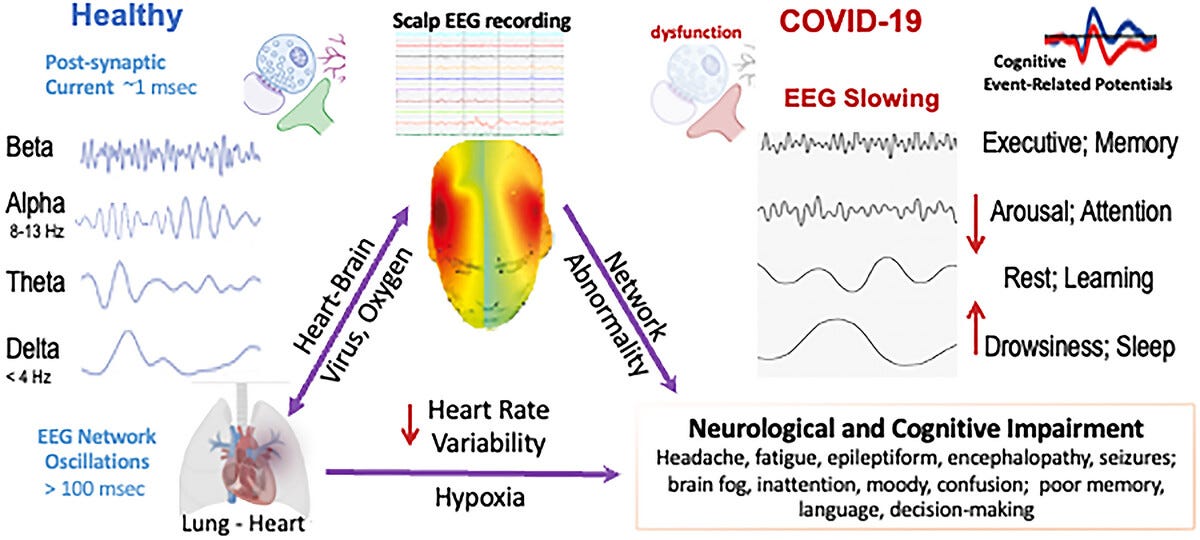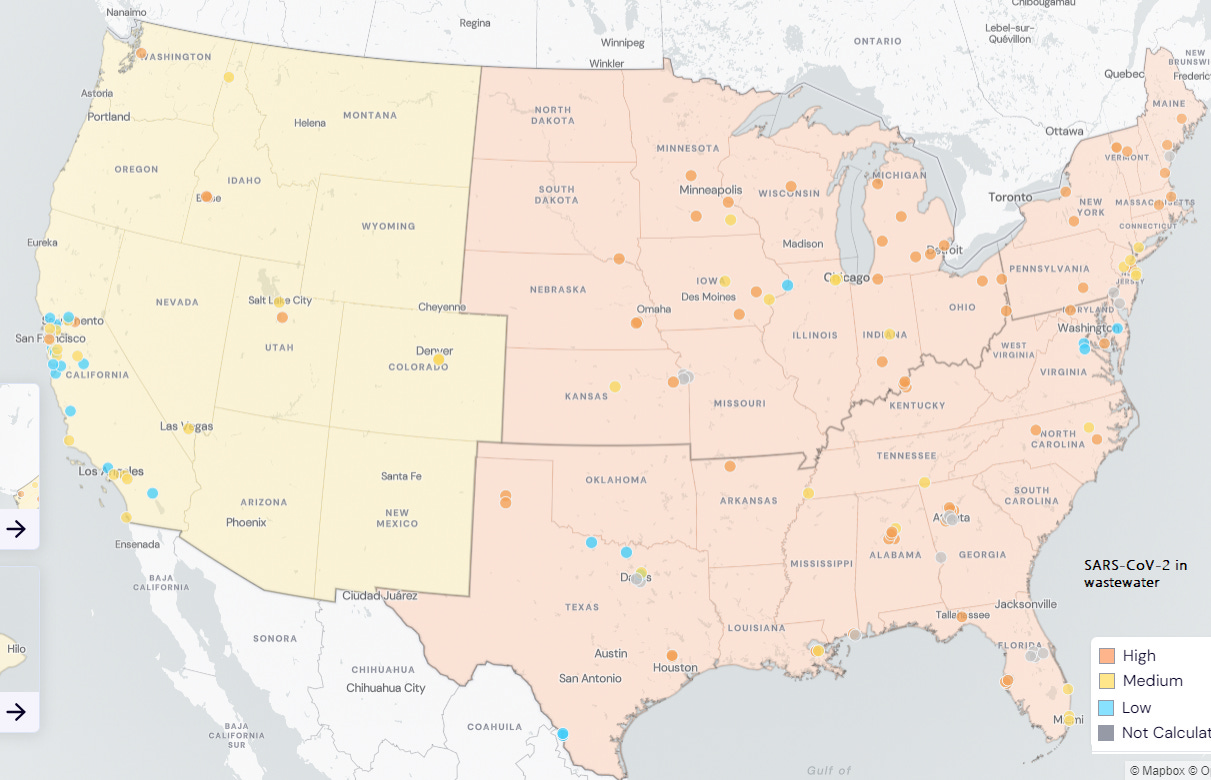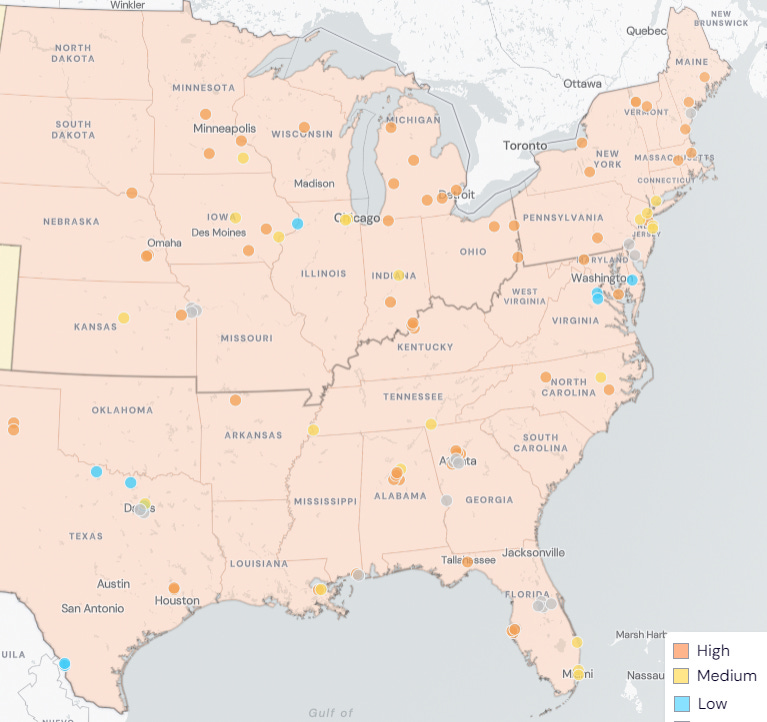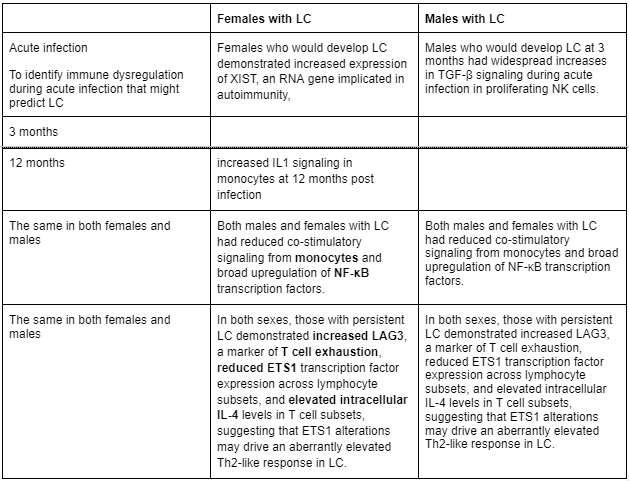The summer COVID wave appears to have peaked in most places except the midwest. But peaking does not mean that this wave is over. Nationally, there are about 870,000 new infections per day and about 1 in every 38 people is infected. Emergency department visits for COVID infection are starting to decrease, but are still fairly high. Hospitalization data is still spotty, but American hospitals will be required to report their COVID hospitalization data again on November 1. Weekly deaths from COVID continue to rise with more than 1,000 COVID deaths reported last week for the third week in a row.
Wastewater SARS-CoV-2
CDC wastewater reporting: https://www.cdc.gov/nwss/rv/COVID19-nationaltrend.html
Oregon, North Carolina and Oklahoma have extremely high levels of SARS-CoV-2 in wastewater now, followed by very high levels in South Carolina, Minnesota, Arkansas, Idaho, Alabama, Louisiana, Kentucky, Indiana and Wyoming.
National SARS-CoV-2 wastewater levels https://iowacovid19tracker.org/
In Canada, 1 in every 32 people is currently infected nationally with 1 in 26 people infected in Ontario and Nova Scotia. In North Toronto, wastewater levels of SARS-CoV-2 are almost as high as during the Omicron wave. The rest of Toronto has levels more consistent with the rest of the country.
From: https://x.com/munakadri/status/1831708032398430450
Acute COVID infections
UCSF LIINC is a biobank containing samples from people who had COVID and are being followed longitudinally over time. A new LIINC study compared 32 people who went on to get Long COVID (PASC) to 72 control patients who recovered without Long COVID. People who went on to get Long COVID (PASC) had higher SARS-CoV-2 RNA and N-antigen levels and higher virus shedding during their acute COVID infection, as well as lower SARS-2 spike IgG antibodies within the first 9 days of infection. Host cytokine marker levels during acute COVID infection were the same in people who went on to get Long COVID and those who did not.
From: https://www.nature.com/articles/s41467-024-51893-7
Sex differences in immune response
In general, males tend to be more vulnerable to severe acute COVID infections and females are more likely to have autoimmunity (Long COVID, lupus, multiple sclerosis). In order to study if this is due to differences in sex chromosomes (XX vs. XY) or differences in sex hormones, a group from Sweden looked at immune responses in 23 trans men who were born as female and have XX sex chromosomes, but were undergoing gender-affirming hormone treatment with testosterone. They found that when trans men started testosterone, it caused decreases type-1 IFN release from plasmacytoid dendritic cells and monocytes, increases in TNF, IL-6 and IL-15 production via monocytes, and activation of nuclear factor kappa B-regulated genes and interferon-γ responses in natural killer (NK) cells. They concluded that immune responses were modulated by the sex hormone testosterone and were not due to sex chromosomes.
Regarding sex differences in immune response, there have been two other interesting studies from earlier this year that looked at immune differences in females vs. males with Long COVID:
3/4/24 MedRxiV (Guan, Putrino, Iwasaki): Sex differences in symptomatology and immune profiles of Long COVID https://buff.ly/3Ts2olc
6/19/24 BioRxiV (Stanford): Sex differences and immune correlates of Long COVID development, persistence, and resolution https://buff.ly/4eS6Mmj
COVID Lung Fibrosis
In Pulmonary Long COVID, the lungs can be damaged by scarring, but by targeting specific immune cells, scientists were able to reverse lung fibrosis. Using a mouse model of COVID infection in the lungs, CD8+ T cells were found to be making high levels of IFN-gamma and TNF to stimulate local IL-1b production by monocyte-derived macrophages. This was preventing the differentiation of epithelial progenitor cells after COVID infection which made it hard for lung cells to repair themselves. Scientists were able to block lung fibrosis after SARS-CoV-2 infection in mice by blocking immune proteins IFN-gamma+TNF or IL-1b activity in post-viral fibrotic lungs.
Pediatrics
This week, Danilo Buonsenso’s lab published a large study of 1296 children and teens with COVID-19 who were followed prospectively for up to three years finding that 23% of them developed Long COVID at three months and 7.1% were still affected by Long COVID at two years. Risk factors for Long COVID included being over age 12, female, and having pre-existing health conditions. Being infected by earlier variants was associated with an increased risk of developing autoimmune diseases after SARS-CoV-2 infection. Vaccination significantly reduced the risk of Long COVID, especially for adolescents. The study highlights the long-term impact of Long COVID on children and the need for further research into its causes and potential treatments.
Vaccines
Most studies have shown that vaccination reduces the risk of Long COVID. A new retrospective EHR study from Mayo Clinic looking at people with a Long COVID diagnosis code in their medical record shows that while 6.9% of people have Long COVID, in their population of 41,652 patients who met study criteria, they found no association between vaccination before COVID infection and the subsequent development of "medically diagnosed" PASC. This is contrary to what has been found by many others including Dr. Ziyad Al-Aly’s recent study which showed that vaccination reduces the risk of Long COVID by about 40 to 50%. His group’s data showed that vaccination can have "profound effect in pulmonary symptoms of COVID, and less on metabolic effects on Long COVID."
Social and Advocacy
The Patient Led Research Collaborative (PLRC) is recruiting volunteers to join their Long COVID policy-driven advocacy efforts. They are especially looking for volunteers who are well versed in US government & policy.
The New York State Insurance Fund (NYSIF) is New York state’s largest, not-for-profit workers’ compensation insurer. They have just published an educational pamphlet for employers to help them understand Long COVID, "the risks posed by Long Covid to the workforce, how to mitigate those risks, and how to support those affected.”
Antiviral treatments and Prevention
A group from UT Austin was evaluating antibody formation after SARS-CoV-2 infections and vaccinations and they found an antibody from one person called SC27 that is able to neutralize all known SARS-CoV-2 variants as well as some SARS-like coronaviruses from animals. The group then evaluated what makes SC27 so broadly neutralizing so as to understand how to apply findings to future vaccines and treatments.
Using an agent-based model calibrated on 178 outbreaks in acute care settings in Victoria, Australia between October 2021 and July 2023, researchers found that if hospital staff wore N95 respirator masks and patients were screened on admission for COVID infection with a rapid antigen test (RAT), A$78.4 Million per year was saved and 1543 deaths per year were prevented. Staff N95 masking alone saved A$54.7 Million and 854 deaths per year and screening with RAT alone saved A$57.6 Million and 1176 deaths per year. Prevention works.
Paxlovid (nirmatrelvir-ritonavir) remains an effective treatment for preventing severe COVID-19, including hospitalization and death, in high-risk patients. A new study shows that racial and ethnic disparities affect access to Paxlovid. Regarding Long COVID, results are mixed as to whether Paxlovid can help prevent or treat the disease. Some studies suggest a small reduction in Long COVID risk, particularly when taken within five days of infection. Pfizer is developing a second-generation antiviral called Ibuzatrelvir which could offer similar benefits to Paxlovid without the side effects of ritonavir. A phase III trial still needs to be completed before Ibuzatrelvir could be FDA approved.
Two new articles this week (here and here) talk about the importance of good indoor air quality in schools. With pandemic fatigue and the fact that politicians have declared that the COVID pandemic is over, people feel like they don’t need to worry about indoor air quality anymore. But, if people are no longer taking precautions and are no longer masking even in hospitals, it is especially important to make sure that the indoor air in schools, workplaces and health care facilities is well filtered to help prevent respiratory diseases like COVID and the flu.
Long COVID
A new review by Alzheimer's experts shows that some Long COVID patients have cognitive impairments including memory problems, confusion and difficulty concentrating that are similar to those seen in Alzheimer's disease and related dementias (ADRD). Slowed brain activity on EEG is also seen in both Long COVID and dementia patients and may be related to shared mechanisms like neuroinflammation, astrocyte activation, and blood vessel damage. The authors recommend that cognitive dysfunction in Long COVID be evaluated and followed with routine EEG.
From: https://alz-journals.onlinelibrary.wiley.com/doi/10.1002/alz.14089
Another review explores the potential link between Long COVID and pituitary dysfunction, particularly involving the hypothalamic-pituitary axis. The hypothalamic-pituitary axis is responsible for hormone pathways that result in cortisol and growth hormone and may be impaired in some people after COVID infection. Long COVID symptoms, such as fatigue, neurocognitive issues, and muscle weakness, overlap significantly with symptoms of pituitary dysfunction and hormonal imbalances. This review emphasizes the need for further research into this connection, particularly regarding adrenal insufficiency, hypogonadism, and growth hormone deficiency, and calls for routine hormonal assessments in Long COVID patients.
A group from the University of Toronto looked at subjective and objective measurements of cognitive function in 150 people with Long COVID and found that subjective symptoms correlated with objective cognitive testing. They recommend that doctors treating patients with Long COVID (PASC) with cognitive issues rely on patient-reported information when assessing cognition during check-ups.
Many with Long COVID complain of unrefreshing sleep. Forty-two people with PASC (Long COVID) underwent sleep studies. “Five categories of sleep disorder syndromes were observed following a sleep clinic evaluation, including obstructive sleep apnea, chronic insomnia disorder, primary hypersomnia, REM behavior disorder (RBD), and new onset circadian phase delay. Seven patients had idiopathic hypersomnia, and two had narcolepsy type 2… A peculiar form of insomnia was a persistent loss of sleep regularity.” Since sleep symptoms are common in Long COVID, the authors recommend a complete sleep evaluation in symptomatic patients.
A new study discusses that “Enhanced External Counterpulsation (EECP) is an FDA-approved, non-invasive treatment for the management of cardiovascular symptoms with a mechanism of action which stimulates pathways that induce endothelial homeostasis, improving microvascular function, inflammation, and immune regulation, thereby potentially targeting the underlying etiology of long COVID.” The authors had previously reported using EECP on 231 patients with Long COVID improved their symptoms, but that study did not include a control group. This new study looks at 33 Long COVID patients vs 33 controls. It found that people with Long COVID who received EECP had a decrease in fatigue, an increase in their activity level, and an improvement in their breathing compared to Long COVID controls. The authors recommend a larger randomized clinical trial to test the benefits of EECP in Long COVID. Of note, author Dr. Monica Verduzco-Gutierrez tweeted that EECP therapy “can be too much” for Long COVID patients with ME/CFS and significant post-exertional malaise (PEM).
Two physicians, Drs. Blitshteyn and Verduzco-Gutierrez, with expertise in Long COVID wrote a piece stating that although the world has tried to move on to a “new normal”, COVID infection continues to cause long term disabling diseases such as Long COVID and other chronic illnesses like diabetes and heart disease. They review the data and recommend mitigation techniques including masking, improving air quality, quarantining for a minimum of 5 days if COVID positive, investing in Long COVID clinics, looking for treatments for Long COVID and providing medical education on Long COVID.
H5N1
The CDC reports that a person with no known exposure to infected animals was hospitalized with H5N1 avian flu in Missouri. This raises the possibility of community transmission, but the CDC is still investigating how the person became infected.
Mpox
99,000 donated Mpox vaccines arrived this week to the DRC in Africa and another 101,000 doses will be delivered within a few days.
Other news
In a nationwide Danish study, air pollution was found to be associated with male infertility. Road traffic noise was associated with female infertility in women age 35 and older and in men aged 37 to 45.
HPV (human papillomavirus) can cause cervical cancer and several other cancers. Vaccination against HPV is recommended for both boys and girls, but boys have much lower vaccination rates than girls. At an andrology clinic in Argentina, semen analysis was conducted on 205 men and showed that 19% of the samples tested positive for HPV. Samples that were PCR-positive for High-Risk HPV (HR-HPV) showed a higher proportion of dead sperm.
Unlike a study from last month, two new studies in JAMA both show that Semaglutide does not increase suicide risk:
9/3/24 JAMA: Psychiatric Safety of Semaglutide for Weight Management in People Without Known Major Psychopathology https://buff.ly/4eco0tm
"this post hoc analysis suggest that treatment with semaglutide, 2.4 mg, did not increase the risk of developing symptoms of depression or suicidal ideation/behavior vs placebo and was associated with a small but statistically significant reduction in depressive symptoms (not considered clinically meaningful)."
9/3/24 JAMA: GLP-1 Receptor Agonist Use and Risk of Suicide Death https://buff.ly/4dT8zqi
In a study of 124,517 adults starting a GLP-1 receptor agonist versus 174,036 initiating an SGLT2 inhibitor, no increase in suicide was seen with GLP-1 receptor agonists liraglutide and semaglutide.
A press release announced that the iDart Lyme IgG ImmunoBlot Kit just received FDA approval. It tests for IgG antibodies against Borrelia-causing Lyme disease and includes 31 Lyme antigen bands, which is more than other Lyme immunoblot tests available.
Thirty years ago, approximately 28,000 healthy women had a single blood test for High-sensitivity C-reactive protein (CRP), low-density lipoprotein (LDL) cholesterol and lipoprotein(a) and then were followed. The higher the initial blood levels of those 3 tests, the higher the future risk of heart attacks and strokes in the next three decades.
New Māori Queen Nga Wai Hono i te Po was chosen by Māori elders to replace her father, King Tuheitia Pootatau Te Wherowhero VII, who died at age 69 last week. The 27 year old queen has two older brothers, but was chosen to ascend the throne. “The new queen holds a Master of Arts in Tikanga (societal lore of) Māori and has served on a number of boards including that of the Te Kohanga Reo National Trust, an organization charged with revitalizing Māori language.”
Photo: University of Waikoto https://www.waikato.ac.nz/study/student-success-stories/nga-wai-hono-i-te-po-paki/
Have a great rest of your weekend,
Ruth Ann Crystal MD
P.S. I will be taking next week off.
COVID news notes:
US Variant tracker: https://covid.cdc.gov/covid-data-tracker/#variant-proportions
Last week, KP.3.1.1 was 42% of variants. Will be updated next week.
CDC COVID data tracker: https://covid.cdc.gov/covid-data-tracker/index.html#datatracker-home
COVID Emergency Dept visits: https://covid.cdc.gov/covid-data-tracker/#ed-visits_all_ages_combined
9/6/24 BNO News: U.S. to resume mandatory reporting of COVID hospitalizations November 1st https://buff.ly/4geNdF8
Walgreens positivity rate: https://www.walgreens.com/businesssolutions/covid-19-index.jsp
US Wastewater Monitoring:
CDC wastewater reporting: https://www.cdc.gov/nwss/rv/COVID19-nationaltrend.html
CDC wastewater map: https://www.cdc.gov/nwss/rv/COVID19-currentlevels.html
As of 9/5/24
The CDC changed the color of their wastewater SARS-CoV-2 map and Twitter responded:
National SARS-CoV-2 data from Sara Anne Willette: https://iowacovid19tracker.org/
8/24/24 Hospitalizations for COVID in those states that are still reporting.
Wastewater SCAN: https://data.wastewaterscan.org/
California statewide view https://buff.ly/3YObiul
Sewer Coronavirus Alert Network (SCAN) project by Stanford University:
Santa Clara County wastewater: https://publichealth.santaclaracounty.gov/health-information/health-data/disease-data/covid-19/covid-19-wastewater
Marin county: https://coronavirus.marinhhs.org/surveillance
COVID deaths per week: https://covid.cdc.gov/covid-data-tracker/#trends_weeklydeaths_weeklypctdeaths_00
Weekly deaths from COVID continue to rise
https://x.com/BNOFeed/status/1830431815510671786
JP Weiland: https://x.com/JPWeiland/status/1832186283482841481
Sept 6th update: As the forecast anticipated, this is the first week (of many) of declining infections. Current numbers are still very high, but off of the peak in mid August.
870,000 new infections/day
1 in every 38 people currently infected
44% higher than 12 month avg.
Michael Hoerger modeling: http://pmc19.com/data/, https://twitter.com/michael_hoerger
Tara Moriarty Canadian COVID data: https://x.com/MoriartyLab
9/5/24 Toronto wastewater virus levels are higher than Omicron
https://x.com/munakadri/status/1831708032398430450
File this under covid yikes, the North Toronto wastewater data is not wrong. I just got a response from the National Wastewater Program. We are in a surge that rivals the original omicron surge.
9/2/24 Italy update https://x.com/Antonio_Caramia/status/1830664479904014752
Acute COVID infections, General COVID info
9/4/24 Nature: An aberrant immune–epithelial progenitor niche drives viral lung sequelae https://buff.ly/4cUnv5Z
Author Harish Narasimhan’s tweet https://x.com/hnarasim23/status/1831401696440021050
9/4/24 As Harish Narasimhan from the University of Virginia explains in The Conversation:
Long COVID inflicts deep scars on the lungs, but targeting specific immune cells could reverse damage − new research in mice
9/4/24 Petter Brodin https://x.com/BrodinPetter/status/1831349401035395217
New paper out @Nature - why are males more vulnerable to severe infections (ex acute #COVID), while females suffer more from autoimmunity (SLE, MS etc and also #LongCovid)? sex chromosomes or hormones? Here we studied adaptation of human immune systems to gender-affirming testosterone treatment in trans-men assigned female sex at birth
9/4/24 Nature: Immune system adaptation during gender-affirming testosterone treatment - Nature https://buff.ly/3TgSqCw
Changes in immune cells were due to the sex hormone testosterone and not due to sex chromosomes.
Two other studies have looked at sex differences in immune cells in Long COVID:
3/4/24 MedRxiV (Guan, Putrino, Iwasaki): Sex differences in symptomatology and immune profiles of Long COVID https://buff.ly/3Ts2olc
n = 165 people with or without Long COVID (LC)
6/19/24 BioRxiV (Stanford): Sex differences and immune correlates of Long COVID development, persistence, and resolution https://buff.ly/4eS6Mmj
Predicting who will get Long COVID at the time of their acute COVID infection.
https://x.com/MichaelPelusoMD/status/1829935226661052448
8/29/24 Nature (UCSF LIINC): Early biological markers of post-acute sequelae of SARS-CoV-2 infection https://buff.ly/3XqVu1z
UCSF LIINC biobank: https://covidresearch.ucsf.edu/projects/long-term-impact-infection-novel-coronavirus-liinc-observational-study
Social and Advocacy
Patient Led Research Collaborative (PLRC) Advocacy Volunteers Needed https://buff.ly/3ZdqZNF
9/3/24 NYSIF Publishes Long Covid Information for Employers https://buff.ly/4ecAO2W
Pediatrics
10/2024 (9/5/2024) Lancet eClinical Medcine (Danilo Buonsenso): Characteristics and predictors of Long Covid in children: a 3-year prospective cohort study https://buff.ly/4cU4q3S
This week, Danilo Buonsenso’s lab published a large prospective study of 1296 children and teens with COVID-19 prospectively for up to three years, highlights the long-term impact of Long COVID on children and calls for further research into its causes and potential treatments.
8/31/24 WTOP News: Some parents might miss signs their child has long COVID https://buff.ly/47qEBYl
“The younger children tended to, in this study, show more gastrointestinal side effects, show a little bit more of the neurocognitive findings, the attention, the memory difficulties, whereas the adolescents really had more focus on the fatigue,” Dr. Alexandra Yonts said.
Vaccines
8/28/24 Open Forum Infectious Diseases (Mayo Clinic): Association of COVID-19 Vaccination with Risk of Medically-Attended Post-Acute Sequelae of COVID-19 During the Ancestral, Alpha, Delta, and Omicron Variant Eras https://buff.ly/3Zjgusa
Most studies have shown that vaccination reduces the risk of Long COVID. A new retrospective EHR study from Mayo Clinic looking at people with a Long COVID diagnosis code. They found no association between vaccination before COVID infection and the subsequent development of "medically diagnosed" PASC.
In CIDRAP, study author "Dr. Melanie Swift said that vaccines still play a role in preventing long COVID. "If you don't get COVID, you don't get long COVID."
Other scientists were interviewed by CIDRAP https://buff.ly/47vo0Tf
Dr. Cliff Rosen
Ziyad Al-Aly et al. in Nature: Long COVID science, research and policy https://buff.ly/4dg0jjP
He just published a review of evidence showing that vaccination reduces the risk of long COVID. While the effect size varies by 15% to 70%, there is an estimated average reduction of 40% to 50%, almost universally.
Antiviral treatments and Prevention
9/3/24 Medical Xpress: Newly discovered antibody protects against all COVID-19 variants https://buff.ly/3TnGWgO
The University of Texas at Austin discovered and isolated a broadly neutralizing plasma antibody, called SC27, from a single patient able to neutralize all known variants of SARS-CoV-2, the virus that causes COVID-19, as well as distantly related SARS-like coronaviruses that infect other animals.
8/20/24 Cell (UT, Austin): Hybrid immunity to SARS-CoV-2 arises from serological recall of IgG antibodies distinctly imprinted by infection or vaccination https://buff.ly/47gOSGm
9/6/24 JAMA: Who Needs Paxlovid in 2024? https://buff.ly/4dPflx2
Newer drug ibuzatrelvir, without Paxlovid’s side effects, is being tested.
10/2024 J of Hospital Infection (Australia): Admission screening testing of patients and staff N95 respirators are cost-effective in reducing COVID-19 hospital-acquired infections https://buff.ly/3Xihxq2
Admission screening testing of patients and staff N95 respirators reduce costs and deaths from COVID.
8/30/24 Chemical & Engineering News: Indoor air monitoring goes to school https://buff.ly/47fAtdu
9/3/24 Scientific American: Kids Are Headed Back to School. Are They Breathing Clean Air? https://buff.ly/47g8ISb
“People are like, ‘There’s not a whole lot you can do about it,’ and that is why, societally, we need to do something about it,” Gronvall says. “We did this for water once upon a time, and we can do it for air.”
Long COVID
9/6/24 Pituitary: Long COVID and pituitary dysfunctions: a bidirectional relationship? https://buff.ly/4ef1vE8
8/29/24 Alzheimer's Association: Parallel electrophysiological abnormalities due to COVID‐19 infection and to Alzheimer's disease and related dementia https://buff.ly/4e8X79A
A review by Alzheimer's experts shows that some Long COVID patients may experience abnormal brain activity on EEG and cognitive impairments such as memory problems, confusion and difficulty concentrating that are similar to those seen in Alzheimer's disease and related dementias (ADRD).
8/29/24 Sleep Medicine: Sleep disorder syndromes of post-acute sequelae of SARS-CoV-2 (PASC) / Long Covid https://buff.ly/3Zgj9Dj
8/27/24 European Archives of Psychiatry and Clinical Neuroscience (U Toronto): Subjective and objective measures of cognitive function are correlated in persons with Post-COVID-19 Condition: a secondary analysis of a Randomized Controlled Trial https://buff.ly/4eayIAo
Measuring cognitive dysfunction with testing correlated with what 150 people with Long COVID subjectively said about their cognitive problems.
9/1/24 American Journal of Physical Medicine & Rehabilitation (S. Blitshteyn, M. Verduzco-Gutierrez MD): Long COVID: A Major Public Health Issue https://buff.ly/3MuiDty
9/2/24 COVID: Enhanced External Counterpulsation (EECP) Improves Dyspnea, Fatigue, and Functional Capacity in Patients with Long COVID https://buff.ly/3Muzoox
People with Long COVID who received EECP had a decrease in fatigue, an increase in their activity level, and an improvement in their breathing compared to Long COVID controls.
Threads from Dr. Verduzco-Gutierrez: https://x.com/MVGutierrezMD/status/1830623315485945873
https://x.com/MVGutierrezMD/status/1830763743803842611
“Because these were from different centers, that aspect is not collected at each place. But my input is if someone has too much PEM or ME/CFS, the treatment can be too much for them. Most POTS patients can handle starting low/slow, but it's not a cure for POTS. MCAS can handle.”
H5N1
9/6/24 CDC Confirms Human H5 Bird Flu Case in Missouri https://buff.ly/4cZaVTd
https://www.cdc.gov/media/releases/2024/s0906-birdflu-case-missouri.html
Person with no known exposure to infected animals has H5N1 avian flu in Missouri. This could mean that there was community transmission possibly.
Mpox
https://x.com/mvankerkhove/status/1831676617099207077
Mpox vaccines have arrived to the DRC.
Other news
9/4/24 BMJ: Long term exposure to road traffic noise and air pollution and risk of infertility in men and women: nationwide Danish cohort study https://buff.ly/4dTTBAc
8/23/24 Eurekalert: Men infected with high-risk types of HPV could struggle with fertility https://buff.ly/3Zg5wnC
Samples that were PCR-positive for High-Risk HPV (HR-HPV) showed a higher proportion of dead sperm.
Two new studies in JAMA both show that Semaglutide does not increase suicide risk:
9/3/24 JAMA: Psychiatric Safety of Semaglutide for Weight Management in People Without Known Major Psychopathology https://buff.ly/4eco0tm
https://jamanetwork.com/journals/jamainternalmedicine/fullarticle/2823084
"this post hoc analysis suggest that treatment with semaglutide, 2.4 mg, did not increase the risk of developing symptoms of depression or suicidal ideation/behavior vs placebo and was associated with a small but statistically significant reduction in depressive symptoms (not considered clinically meaningful)."
9/3/24 JAMA: GLP-1 Receptor Agonist Use and Risk of Suicide Death https://buff.ly/4dT8zqi
In a study of 124,517 adults starting a GLP-1 receptor agonist versus 174,036 initiating an SGLT2 inhibitor. No increase in suicide was seen with GLP-1 receptor agonists liraglutide and semaglutide were studied in Sweden and Denmark.
9/3/24 ID-FISH press release: Lyme ImmunoBlot Receives FDA Clearance https://buff.ly/3Ti3AqV
8/31/24 NEJM: Inflammation, Cholesterol, Lipoprotein(a), and 30-Year Cardiovascular Outcomes in Women https://buff.ly/3MOKxkp
A single combined measure of high-sensitivity CRP, LDL cholesterol, and lipoprotein(a) levels among initially healthy U.S. women was predictive of incident cardiovascular events during a 30-year period.
9/5/24 CNN: New Māori Queen anointed in New Zealand following the death of her father https://buff.ly/3MDBKl7

































I have been struggling with Long Covid for over 2 years- was vaxxed, boosted, fit marathon runner and Omicron hammered me despite Paxlovid for 5 days. Two things that might be interesting in terms of follow up studies: 1. I was just reinfected for the first time, which feels impossible considering I wear an N95 mask literally everywhere and don't allow people in my house without a Metrix test, but this time I took Pax for 10 days and didn't rebound. I did really well with my reinfection and about a month out, don't seem to have any additional LC strain. I know there have been some studies on prolonged Pax administration to avoid rebound and would be curious what you think. 2. I did have an uptick in restless leg syndrome this infection and, in general, since contracting Long Covid. I heard about Dr. Joffe's work out of Australia and pitched it to my LC specialist. He knows Dr. Joffee- very cool!- and prescribed Pramipexole, a dopamine agonist, as he is seeing a real dopamine depletion in LC patients. It has been a game changer.
Thank you. Hope you’ll have a refreshing break next week.